- Home
- William Shakespeare
Love's Labour's Lost (Arden Shakespeare) Page 5
Love's Labour's Lost (Arden Shakespeare) Read online
Page 5
To the Princess
KING Madam, your father here doth intimate130
The payment of a hundred thousand crowns,
Being but th'one half of an entire sum
Disbursed by my father in his133 wars.
But say that he or we, as neither have134,
Received that sum, yet there remains unpaid
A hundred thousand more, in surety136 of the which,
One part of Aquitaine is bound137 to us,
Although not valued to138 the money's worth.
If then the king your father will restore139
But that one half which is unsatisfied140,
We will give up our right in Aquitaine
And hold fair friendship with his majesty.
But that, it seems, he little purposeth143,
For here he doth demand to have repaid144
An hundred thousand crowns, and not demands,145
On payment of a hundred thousand crowns,
To have his title live in147 Aquitaine,
Which we much rather had depart withal148,
And have the money by our father lent,
Than Aquitaine, so gelded150 as it is.
Dear princess, were not his requests so far
From reason's yielding, your fair self should make
A yielding gainst some reason153 in my breast
And go well satisfied to France again.
PRINCESS You do the king my father too much wrong
And wrong the reputation of your name,
In so unseeming157 to confess receipt
Of that which hath so faithfully been paid.
KING I do protest I never heard of it.
And if you prove it, I'll repay it back
Or yield up Aquitaine.
PRINCESS We arrest your word162.
Boyet, you can produce acquittances163
For such a sum from special officers
Of Charles, his165 father.
KING Satisfy me so166.
BOYET So please your grace, the packet is not come
Where that and other specialties168 are bound.
Tomorrow you shall have a sight of them.
KING It shall suffice me; at which interview,
All liberal reason171 would I yield unto.
Meantime receive such welcome at my hand
As honour without breach of honour173 may
Make tender of174 to thy true worthiness.
You may not come, fair princess, in my gates,
But here without176 you shall be so received
As177 you shall deem yourself lodged in my heart,
Though so denied fair harbour in my house.
Your179 own good thoughts excuse me, and farewell:
Tomorrow we shall visit you again.
PRINCESS Sweet health and fair desires consort181 your grace.
KING Thy own wish wish I thee in every place182!
Exit [the King, with Longaville and Dumaine]
BEROWNE Lady, I will commend you to my own heart.
ROSALINE Pray you, do my commendations184, I would be glad to
see it.
BEROWNE I would you heard it groan.
ROSALINE Is the fool187 sick?
BEROWNE Sick at the heart.
ROSALINE Alack, let it blood189.
BEROWNE Would that do it good?
ROSALINE My physic191 says 'ay'.
BEROWNE Will you prick't with your eye192?
ROSALINE Non point193, with my knife.
BEROWNE Now, God save thy life!
ROSALINE And yours from long living!
BEROWNE I cannot stay thanksgiving196.
Exit
Enter Dumaine
To Boyet
DUMAINE Sir, I pray you a word: what lady is that
same?
BOYET The heir of Alencon, Katherine199 her name.
DUMAINE A gallant200 lady. Monsieur, fare you well.
[Exit]
[Enter Longaville]
To Boyet
LONGAVILLE I beseech you a word: what is she in the
white?
BOYET A woman sometimes, if you saw her in the light.
LONGAVILLE Perchance light in the light204. I desire her name.
BOYET She hath but one for herself, to desire205 that were a
shame.
LONGAVILLE Pray you, sir, whose daughter?
BOYET Her mother's, I have heard.
LONGAVILLE God's blessing o'your beard!
BOYET Good sir, be not offended.
She is an heir of Falconbridge.
LONGAVILLE Nay, my choler212 is ended.
She is a most sweet lady.
Exit Longaville
BOYET Not unlike214, sir, that may be.
Enter Berowne
BEROWNE What's her name in the cap?
BOYET Rosaline, by good hap216.
BEROWNE Is she wedded or no?
BOYET To her will, sir, or so218.
BEROWNE You are welcome, sir. Adieu.
BOYET Farewell to me, sir, and welcome to you220.
Exit [Berowne]
MARIA That last is Berowne, the merry madcap lord.
Not a word with him but a jest.
BOYET And every jest but a word.
PRINCESS It was well done of you to take him at his word224.
BOYET I was as willing to grapple as he was to board225.
MARIA Two hot sheeps226, marry.
BOYET And wherefore not 'ships'?
No sheep, sweet lamb, unless we feed on your lips.
MARIA You sheep, and I pasture229. Shall that finish the jest?
BOYET So230 you grant pasture for me.
Tries to kiss her
MARIA Not so, gentle beast.
My lips are no common, though several232 they be.
BOYET Belonging to whom?
MARIA To my fortunes and me.
PRINCESS Good wits will be jangling; but, gentles235, agree.
This civil236 war of wits were much better used
On Navarre and his bookmen, for here 'tis abused237.
BOYET If my observation -- which very seldom lies
By the heart's still239 rhetoric disclosed with eyes --
Deceive me not now, Navarre is infected.
PRINCESS With what?
BOYET With that which we lovers entitle affected242.
PRINCESS Your reason?
BOYET Why, all his behaviours did make their retire244
To the court of his eye, peeping thorough245 desire.
His heart, like an agate, with your print impressed246,
Proud with his form247, in his eye pride expressed.
His tongue, all impatient to speak and not see248,
Did stumble with haste in his eyesight to be.
All senses to that sense did make their repair250,
To feel only looking on fairest of fair.
Methought all his senses were locked in his eye,
As jewels in crystal253 for some prince to buy,
Who, tend'ring their own worth from whence they were glassed254,
Did point255 out to buy them along as you passed.
His face's own margin did quote256 such amazes
That all eyes saw his eyes enchanted with gazes.
I'll give you Aquitaine, and all that is his,
An259 you give him for my sake but one loving kiss.
PRINCESS Come to our pavilion. Boyet is disposed260.
BOYET But261 to speak that in words which his eye hath
disclosed.
I only have made a mouth of his eye,
By adding a tongue which I know will not lie.
ROSALINE Thou art an old love-monger and speakest
skilfully.
MARIA He is Cupid's grandfather and learns news of him.
KATHERINE Then was Venus267 like her mother, for her father267 is but grim268.
BOYET Do you hear, my mad269 wenches?
MARIA No.
BOYET What then, do you see?
KATHERINE Ay, our way to be gone.
BOYET You are too hard273 for me.
Exeunt
Act 3 [Scene 1]
running scene 3
Enter Braggart [Armado] and [his] Boy [Moth, singing a] song
ARMADO Warble, child, make passionate my sense of
hearing.
Sings
MOTH Concolinel3.
ARMADO Sweet air4! Go, tenderness of years, take this key, give
enlargement to the swain, bring him festinately5 hither. I
must employ him in a letter to my love.
MOTH Master, will you win your love with a French brawl7?
ARMADO How meanest thou? Brawling8 in French?
MOTH No, my complete master: but to jig off a tune9 at the
tongue's end, canary to it with your feet, humour10 it with
turning up your eyelids, sigh a note and sing a note,
sometime through the throat, if you swallowed love with
singing love, sometime through the nose as if you snuffed up
love by smelling love, with your hat penthouse-like14 o'er the
shop of your eyes, with your arms crossed on your thin-belly15
doublet like a rabbit on a spit, or your hands in your pocket
like a man after17 the old painting, and keep not too long in
one tune, but a snip and away. These are compliments18, these
are humours, these betray nice19 wenches that would be
betrayed without these and make them men of note20 -- do
you note, men? -- that most are affected21 to these.
ARMADO How hast thou purchased22 this experience?
MOTH By my penny of observation.
ARMADO But O, but O--
MOTH 'The hobby-horse is forgot.'25
ARMADO Callest thou my love 'hobby-horse26'?
MOTH No, master. The hobby-horse is but a colt27, and your
love perhaps, a hackney28. But have you forgot your love?
ARMADO Almost I had.
MOTH Negligent student! Learn her by heart.
ARMADO By heart and in heart, boy.
MOTH And out of heart, master: all those three I will
prove33.
ARMADO What wilt thou prove?
MOTH A man, if I live, and this, 'by', 'in', and 'without',
upon the instant: 'by' heart you love her, because your heart
cannot come by37 her. 'In' heart you love her, because your
heart is in love with her. And 'out' of heart you love her,
being out of heart39 that you cannot enjoy her.
ARMADO I am all these three.
MOTH And three times as much more, and yet nothing at
all.
ARMADO Fetch hither the swain. He must carry me43 a letter.
MOTH A message well sympathized44: a horse to be
ambassador for an ass.
ARMADO Ha, ha, what sayest thou?
MOTH Marry, sir, you must send the ass upon the horse, for
he is very slow-gaited48. But I go.
ARMADO The way is but short. Away!
MOTH As swift as lead, sir.
ARMADO Thy meaning, pretty ingenious51? Is not lead a metal
heavy, dull and slow?
MOTH Minime53, honest master, or rather, master, no.
ARMADO I say lead is slow.
MOTH You are too swift, sir, to say so.
Is that lead slow which is fired from a gun?
ARMADO Sweet smoke of rhetoric!
He reputes me a cannon; and the bullet, that's he.
I shoot thee at the swain.
MOTH Thump60 then, and I flee.
[Exit]
ARMADO A most acute juvenal, voluble and free of grace61!
By thy favour, sweet welkin62, I must sigh in thy face.
Most rude melancholy, valour gives thee place63.
My herald is returned.
Enter Page [Moth] and Clown [Costard]
MOTH A wonder, master! Here's a costard65 broken in a
shin.
ARMADO Some enigma, some riddle: come, thy l'envoy67,
begin.
COSTARD No egma, no riddle, no l'envoy, no salve in the mail69,
sir. O, sir, plantain70, a plain plantain! No l'envoy, no l'envoy,
no salve, sir, but a plantain!
ARMADO By virtue, thou enforcest laughter: thy silly72
thought, my spleen73. The heaving of my lungs provokes me to
ridiculous74 smiling. O, pardon me, my stars! Doth the
inconsiderate take salve75 for l'envoy, and the word 'l'envoy' for a salve?
MOTH Do the wise think them other? Is not l'envoy a
salve?
ARMADO No, page: it is an epilogue or discourse, to make
plain
Some obscure precedence that hath tofore been sain80.
Now will I begin your moral, and do you follow with my
l'envoy:
The fox, the ape, and the humble-bee83
Were still at odds84, being but three.
Until the goose came out of door,
Staying the odds by adding four86.
MOTH A good l'envoy, ending in the goose.87 Would you
desire more?
COSTARD The boy hath sold him a bargain, a goose, that's flat89.
Sir, your pennyworth is good, an90 your goose be fat.
To sell a bargain well is as cunning as fast and loose91.
Let me see: a fat l'envoy -- ay, that's a fat goose.
ARMADO Come hither, come hither. How did this argument93
begin?
MOTH By saying that a costard was broken in a shin.
Then called you for the l'envoy.
COSTARD True, and I for a plantain: thus came your argument in.
Then the boy's fat l'envoy, the goose that you bought,
And he ended the market99.
ARMADO But tell me, how was there a costard broken in a
shin?
MOTH I will tell you sensibly102.
COSTARD Thou hast no feeling103 of it, Moth. I will speak that l'envoy:
I Costard, running out, that was safely within,
Fell over the threshold105 and broke my shin.
ARMADO We will talk no more of this matter.
COSTARD Till there be more matter107 in the shin.
ARMADO Sirrah Costard, I will enfranchise108 thee.
COSTARD O, marry me to one Frances109: I smell some l'envoy,
some goose110 in this.
ARMADO By my sweet soul, I mean setting thee at liberty,
enfreedoming thy person. Thou wert immured112, restrained,
captivated, bound.
COSTARD True, true, and now you will be my purgation114 and
let me loose115.
ARMADO I give thee thy liberty, set thee from durance116, and in
lieu117 thereof impose on thee nothing but this:
Gives a letter
bear this significant118 to the country maid Jaquenetta. There is
remuneration, for the best ward119 of mine
Gives money
honours is rewarding my dependants120. Moth, follow.
[Exit]
MOTH Like the sequel121, I. Signior Costard, adieu.
Exit
COSTARD My sweet ounce of man's flesh, my incony Jew122!
Now will I look to his remuneration. 'Remuneration' -- O,
that's the Latin word for three farthings124. Three farthings --
remuneration. 'What's the price of this inkle125?' 'One penny.'
'No, I'll give you a remuneration.' Why, it carries it126.
'Remuneration.' Why, it is a fairer name than French crown127.
I will never buy and sell out of128 this word.
Enter Berowne
BEROWNE O, my good knave Costard, exceedingly well met.
COSTARD Pray you, sir, how much carnation130 ribbon may a
man buy for a remuneration?
BEROWNE What is a remuneration?
COSTARD Marry, sir, halfpenny farthing133.
BEROWNE O, why then three farthings worth of silk.
COSTARD I thank your worship. God be wi'you!
Starts to leave
BEROWNE O, stay, slave136, I must employ thee:
As thou wilt win my favour, good my knave137,
Do one thing for me that I shall entreat.
COSTARD When would you have it done, sir?
BEROWNE O, this afternoon.
COSTARD Well, I will do it, sir. Fare you well.
BEROWNE O, thou knowest not what it is.
COSTARD I shall know, sir, when I have done it.
BEROWNE Why, villain144, thou must know first.
COSTARD I will come to your worship tomorrow morning.
BEROWNE It must be done this afternoon.
Hark, slave, it is but this:
The princess comes to hunt here in the park,
And in her train149 there is a gentle lady,
When tongues speak sweetly, then they name her name,
And Rosaline they call her. Ask for her
And to her white hand see thou do commend152
Gives a letter and money
This sealed-up counsel. There's thy guerdon153: go.
COSTARD Gardon154, O sweet gardon! Better than remuneration,
a'leven-pence-farthing better155. Most sweet gardon! I will do it,
sir, in print156. Gardon! Remuneration!
Exit
BEROWNE O and I, forsooth, in love! I, that have been love's whip,
A very beadle to a humorous158 sigh,
A critic, nay, a night-watch constable,
A domineering pedant160 o'er the boy,
Than whom no mortal so magnificent161!
This wimpled, whining, purblind162, wayward boy,
This Signior Junior, giant-dwarf, Don Cupid,
Regent164 of love-rhymes, lord of folded arms,
Th'anointed sovereign of sighs and groans,
Liege of all loiterers and malcontents,
Dread167 prince of plackets, king of codpieces,
Sole imperator168 and great general
Of trotting paritors169 -- O my little heart! --
And I to be a corporal of his field170
And wear his colours like a tumbler's hoop171.
What? I love, I sue172, I seek a wife?
A woman that is like a German clock173,
Still a-repairing, ever out of frame174,
And never going aright175, being a watch,
But being176 watched that it may still go right!
Nay, to be perjured, which is worst of all,
And, among three, to love the worst of all;
A whitely wanton with a velvet brow179,
With two pitch-balls180 stuck in her face for eyes.
Ay, and by heaven, one that will do the deed181
Though Argus were her eunuch182 and her guard.
And I to sigh for her, to watch183 for her,
To pray for her! Go to184, it is a plague
That Cupid will impose for my neglect185
Of his almighty dreadful little might.
Well, I will love, write, sigh, pray, sue and groan.
Some men must love my lady, and some Joan188.
[Exit]

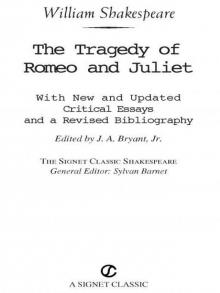 Romeo and Juliet
Romeo and Juliet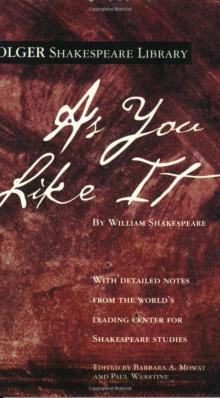 As You Like It (Folger Shakespeare Library)
As You Like It (Folger Shakespeare Library)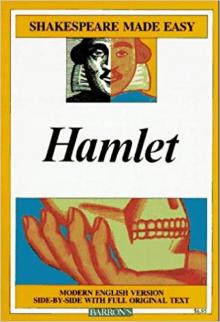 Hamlet
Hamlet Richard II (Folger Shakespeare Library)
Richard II (Folger Shakespeare Library) Macbeth
Macbeth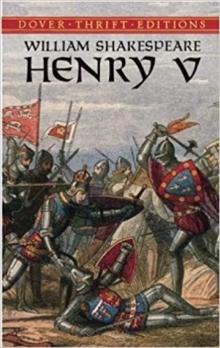 Henry V
Henry V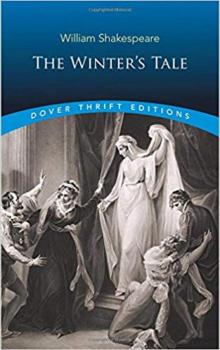 The Winter's Tale
The Winter's Tale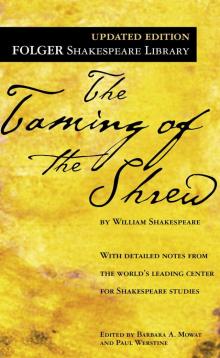 The Taming of the Shrew
The Taming of the Shrew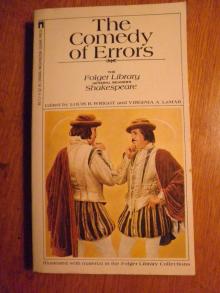 The Comedy of Errors
The Comedy of Errors King Lear (Folger Shakespeare Library)
King Lear (Folger Shakespeare Library)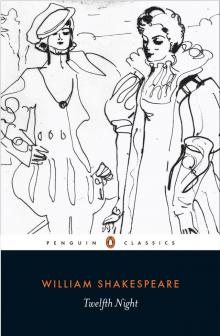 Twelfth Night
Twelfth Night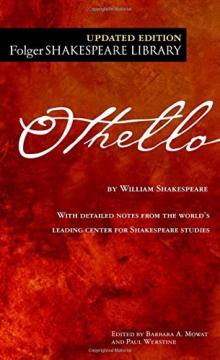 Othello
Othello The Two Gentlemen of Verona
The Two Gentlemen of Verona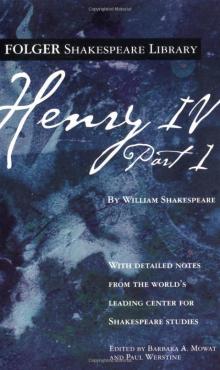 Henry IV, Part 1 (Folger Shakespeare Library)
Henry IV, Part 1 (Folger Shakespeare Library)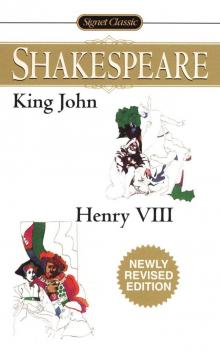 King John/Henry VIII (Signet Classics)
King John/Henry VIII (Signet Classics)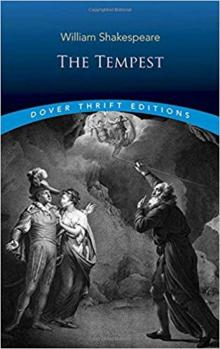 The Tempest
The Tempest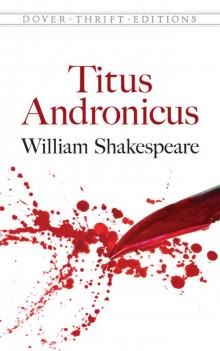 Titus Andronicus (Dover Publications)
Titus Andronicus (Dover Publications)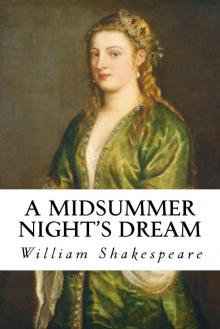 A Midsummer Night's Dream
A Midsummer Night's Dream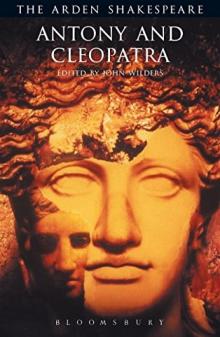 Antony and Cleopatra (Arden Shakespeare: Third Series)
Antony and Cleopatra (Arden Shakespeare: Third Series)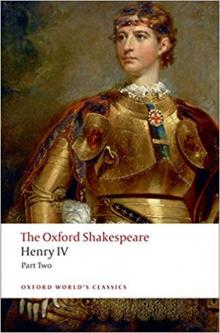 The Oxford Shakespeare: Henry IV, Part 2 (Oxford World's Classics)
The Oxford Shakespeare: Henry IV, Part 2 (Oxford World's Classics)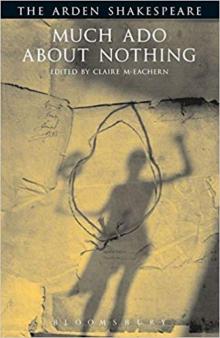 Much Ado About Nothing (Arden Shakespeare: Third Series)
Much Ado About Nothing (Arden Shakespeare: Third Series) All's Well That Ends Well
All's Well That Ends Well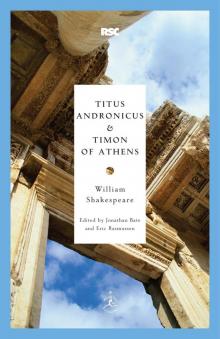 Titus Andronicus & Timon of Athens
Titus Andronicus & Timon of Athens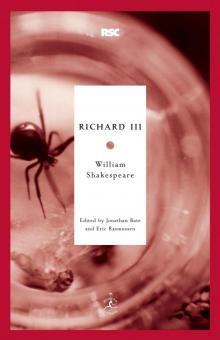 Richard III (Modern Library Classics)
Richard III (Modern Library Classics) Coriolanus
Coriolanus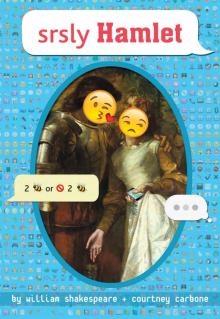 srsly Hamlet (OMG Shakespeare)
srsly Hamlet (OMG Shakespeare)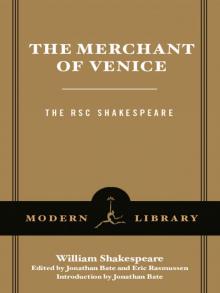 The Merchant of Venice
The Merchant of Venice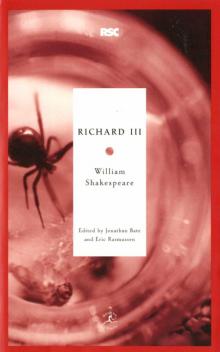 Richard III
Richard III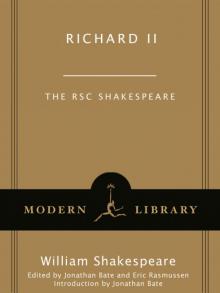 Richard II
Richard II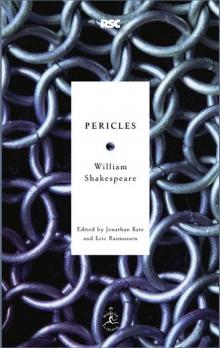 Pericles
Pericles As You Like It
As You Like It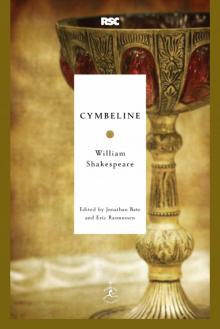 Cymbeline
Cymbeline Alls Wel that ends Well
Alls Wel that ends Well YOLO Juliet
YOLO Juliet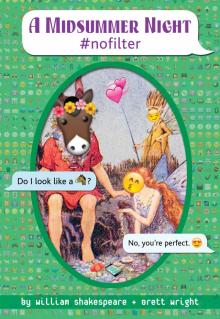 A Midsummer Night #nofilter
A Midsummer Night #nofilter Love's Labour's Lost
Love's Labour's Lost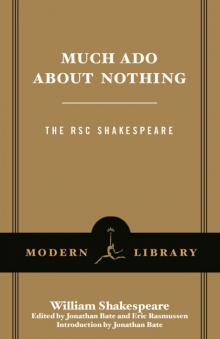 Much Ado About Nothing
Much Ado About Nothing Romeo & Juliet & Vampires
Romeo & Juliet & Vampires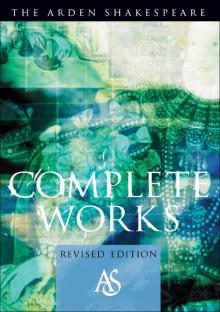 The Arden Shakespeare Complete Works
The Arden Shakespeare Complete Works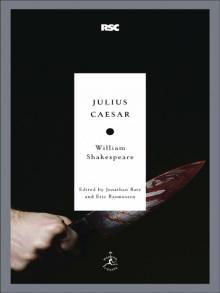 Julius Caesar
Julius Caesar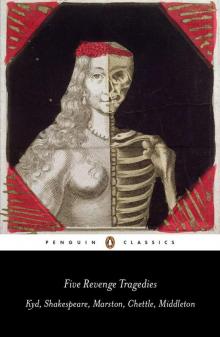 Five Revenge Tragedies: The Spanish Tragedy, Hamlet, Antonio's Revenge, The Tragedy of Hoffman, The Revenger's Tragedy (Penguin Classics)
Five Revenge Tragedies: The Spanish Tragedy, Hamlet, Antonio's Revenge, The Tragedy of Hoffman, The Revenger's Tragedy (Penguin Classics)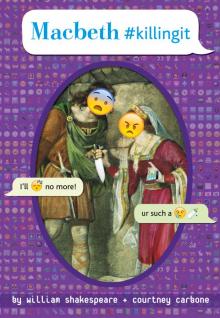 Macbeth #killingit
Macbeth #killingit The Oxford Shakespeare: The Complete Works
The Oxford Shakespeare: The Complete Works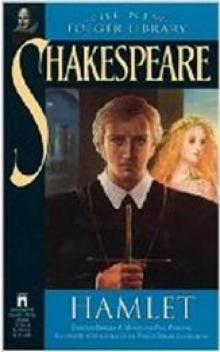 Hamlet, Prince of Denmark (Collins edition)
Hamlet, Prince of Denmark (Collins edition)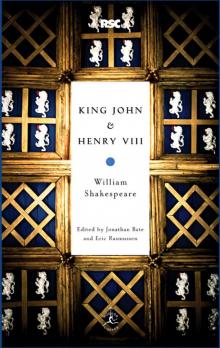 King John & Henry VIII
King John & Henry VIII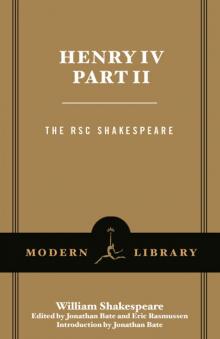 Henry IV, Part 2
Henry IV, Part 2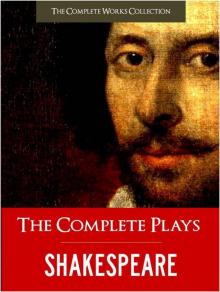 Complete Plays, The
Complete Plays, The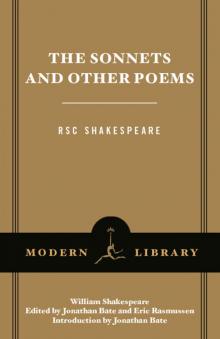 The Sonnets and Other Poems
The Sonnets and Other Poems Antony and Cleopatra
Antony and Cleopatra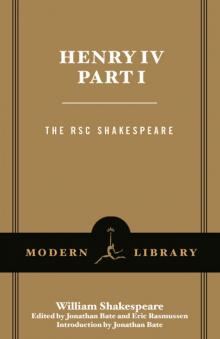 Henry IV, Part 1
Henry IV, Part 1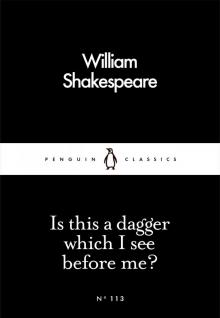 Is This a Dagger Which I See Before Me?
Is This a Dagger Which I See Before Me?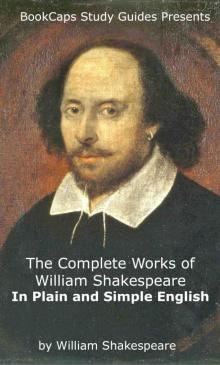 The Complete Works of William Shakespeare In Plain and Simple English (Translated)
The Complete Works of William Shakespeare In Plain and Simple English (Translated) The Sonnets
The Sonnets